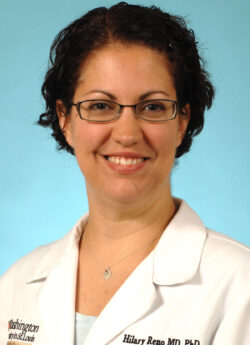Testing, treatment for sexually transmitted infections expanded in north St. Louis County
Expanded services aimed at reducing region’s high STI rates, disparities in sexual health
 Getty Images
Getty ImagesIn a bid to improve sexual health and reduce health disparities in the St. Louis area, Washington University infectious diseases physicians are expanding testing and treatment services for sexually transmitted infections in north St. Louis County.
The St. Louis area has some of the highest rates of sexually transmitted infections (STIs) in the country, with the burden falling particularly heavily on Black residents and people with sexual orientations and gender identities that are marginalized.
In a bid to reduce disparities and improve overall sexual health in the region, the Division of Infectious Diseases at Washington University School of Medicine in St. Louis will offer expanded STI testing and treatment services at its Village Square clinic, located in north St. Louis County, a historically medically underserved area. The effort is supported by a five-year, $2.5 million grant from the Centers for Disease Control and Prevention and is part of a national program to expand access to comprehensive sexual health services.

“St. Louis’ STI rates are very concerning,” said Hilary Reno, MD, PhD, a professor of medicine and the principal investigator on the grant. An STI specialist, Reno sees patients at the Village Square clinic. “Syphilis rates have more than doubled since 2015. We’ve started seeing more cases of congenital syphilis, which can cause babies to be born with physical deformities and neurological problems including blindness or deafness. We are not making the kind of progress we’d like toward ending the HIV epidemic. And the disparities are shocking. STI rates are 11 to 19 times higher among Black than white residents of St. Louis County. It is time for us in the public health community to recognize that what we’re doing isn’t enough and find better ways to get people the services that they need.”
Part of the problem is that the parts of the St. Louis region with the highest rates of STIs — north St. Louis city and county — are also places with minimal access to sexual health-care. In the absence of specialized clinics, many people resort to hospital emergency departments for STI testing and treatment. While emergency departments can and do provide such services, they are not equipped to offer comprehensive STI care, such as follow-up care, contact tracing, and prevention education.
Expanding the services offered by the Village Square clinic in Hazelwood is a first step toward improving testing and care options for people in north St. Louis County. The clinic was established in 2023 primarily to provide care for people living with HIV, and offered limited walk-in HIV testing. With the support of this grant, the clinic aims to offer walk-in testing to anyone at no or low cost, as well as treatment, if needed, for walk-in patients and their sexual partners. The clinic also will provide the HIV preventive medication PrEP, which is taken routinely to reduce the risk of infection, as well as two medications that are taken in the hours after a potential exposure to an STI: PEP (for HIV) and doxyPEP (for syphilis, chlamydia and gonorrhea). Eventually, the plan is to expand prevention education at Village Square and establish mobile services to reach additional underserved communities in north St. Louis County.
The details of which services will be offered and how are yet to be worked out. The first year of the five-year project is dedicated to working in concert with community members to develop a plan tailored to the needs and preferences of the community. Priority will be given to meeting the needs of the most underserved members of the community, including people living with HIV; gender and sexual minorities; young adults; and people of color, especially Black women.
“I once heard someone say, ‘You don’t need focus groups if you incorporate the right voices from the beginning,’” Reno said. “When people have symptoms of an STI, or they’ve learned someone they’ve had sexual contact with has an STI, being able to be seen by a doctor and getting care and treatment very quickly is critically important. Not only does it make them feel better, but it also helps reduce transmission, which benefits the whole community. What we’re hoping to do is build options for clinical care that the community really wants so we can meet their health-care needs and begin to bring STI rates in the region down.”
Along with Reno, the team includes Ernie-Paul Barrette, MD, a professor of medicine at Washington University and the medical director of the Village Square clinic, as well as the St. Louis County Department of Public Health; Planned Parenthood of the St. Louis Region; Christian Hospital, a BJC HealthCare hospital near the Village Square clinic; The SPOT, a Washington University clinic for youth and young adults; and the St. Louis STI/HIV Prevention Training Center.
The Village Square clinic is at 1 Village Square Shopping Center in Hazelwood, Mo.






